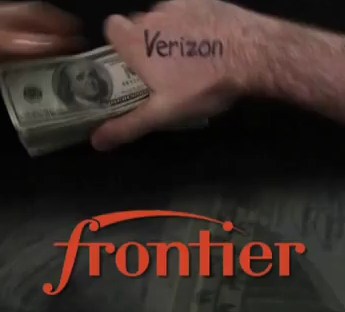 unlimited
unlimited
Main Entry: un·lim·it·ed
Pronunciation: \-ˈli-mə-təd\
Function: adjective
1 : lacking any controls : unrestricted <unlimited access>
2 : boundless, infinite <unlimited possibilities>
3 : not bounded by exceptions : undefined <the unlimited and unconditional surrender of the enemy — Sir Winston Churchill>
An Alaskan Internet service provider is baffling its broadband customers with a blizzard of BS regarding just how unlimited its “unlimited” service plans really are.
A Stop the Cap! reader in The Last Frontier drops us a note to alert us of yet another provider trying to pull a fast one on its customers.
GCI markets cable-TV, telephone and broadband service in larger communities across many parts of the state. Its broadband service, dubbed “Xtreme,” offer DSL-like speeds at a significant price premium over what users in the lower 48 pay for Internet access.
Since 2007, our reader writes, GCI offered customers a deal. In return for letting the company provide all of your telecommunications needs — cable, phone, and Internet, GCI would provide you with unlimited broadband service. The triple-play package was sold for at least $80 a month, and many customers agreed to the bundled route to avoid GCI’s restrictive, data-capped plans sold to its broadband-only customers.
GCI is now reneging on its end of the deal thanks to a creative redefinition of the word “unlimited.” For the convenience of those who may be English-challenged, Stop the Cap! has provided the Merriam-Webster definition of the word “unlimited” above, which hasn’t changed much since its first use in the 15th century.
Broadband providers like GCI think they are clever enough to change all that.
Much to the chagrin of GCI’s bundled customers, the company unfairly slapped a “Fair Access Policy” on all of its unlimited customers on April 1st. Customers started receiving usage warnings this spring, which came as quite a surprise for an “unlimited” service plan. But the company insists it hasn’t limited its “unlimited” plans at all:
GCI offers some cable modem Internet service plans with “unlimited downloads”, meaning GCI does not bill customers additional fees for usage in a given month.
 Actually, that isn’t the meaning of “unlimited” at all, no matter how much the company wishes it was. Again, see the definition above.
Actually, that isn’t the meaning of “unlimited” at all, no matter how much the company wishes it was. Again, see the definition above.
In fact, even using GCI’s own definition, nonsensical as it is, it isn’t reality-based either.
Customers who exceed the arbitrary limits GCI determines as “fair,” could be subjected to higher pricing. GCI’s website currently lists the overlimit fee starting at an impenetrable $0.005 per megabyte, which sounds pretty low until you realize it’s $5.00 per gigabyte, which is significantly higher than what most other naughty cappers charge. On slower speed plans, GCI’s overlimit fee is a whopping $0.03 per megabyte — $30 per gigabyte.
What happens when you overuse your GCI unlimited Internet? GCI will contact you to discuss your account and then ask you to agree to either reduce usage or pay additional fees for usage in a given month.
GCI loves to make its limits look mighty big by representing them in megabytes instead of the more commonly used gigabyte measurement. They also include the usual comparisons: over 10,000 web pages, 250,000 e-mails, 1,000 pictures, etc. On the lower speed plans, GCI avoids defining the far-smaller allowances for higher bandwidth services like near-DVD HD video streaming some Alaskan families may want to use during those cold and dark Alaskan winter evenings.
Here are the limits GCI assigns to its “unlimited” service plans:
| Plan Name |
Usage |
| Ultimate Xtreme |
40,000 MB |
| Ultimate Xtreme Family |
60,000 MB |
| Ultimate Xtreme Entertainment |
80,000 MB |
| Ultimate Xtreme Power |
100,000 MB |
That’s usage ranging from 40-100 gigabytes. What this illustrates yet again is that Internet Overcharging schemes are ridiculously arbitrary. A provider in rural Alaska defines “fair” use of its slowest speed “unlimited” broadband tier (3 Mbps/512 Kbps for $45 a month) at 40 gigabytes. Meanwhile, Frontier Communications considers it fair to define its DSL service usage allowance at just 5 gigabytes per month. Comcast says 250 gigabytes a month is fair. AT&T’s wireless smartphone data plan now carries a 2 gigabyte limit AT&T claims is about right.
As is also commonly the case among Internet Overchargers, any unused allowances do not “roll over” to the next month.
GCI considers anyone exceeding these limits engaged in continuous high-volume data transfers, extensive use of streaming video and peer-to-peer file sharing programs, or using an unsecured wireless signal everyone in the neighborhood has hopped on to use. But just backing up your family computer through an online backup service over a month could easily put you over these limits. If a “mutually agreed on” solution cannot be reached to either limit your use or increase your price, GCI will show you the door.
Essentially, GCI hobbles its broadband service plans by imposing limits on services that could challenge some of its other products. For standalone broadband customers, GCI builds in plenty of protection against customers potentially using its Internet service to bypass its cable and phone offerings, despite some recent speed and usage allowance increases. How much online viewing will you feel safe doing on some of these Internet service plans:
| Standalone Xtreme Plans |
Current Speeds & Included Usage |
New Speeds & Included Usage |
Usage Allowance Increase |
| Xtreme |
1 Mbps/512 Kbps – 5.12 GB usage |
3 Mbps/512 Kbps – 7.5 GB usage |
2.38 GB |
| Xtreme Family |
2 Mbps/512 Kbps – 10.24 GB usage |
6 Mbps/512 Kbps – 15 GB usage |
4.76 GB |
| Xtreme Entertainment |
3 Mbps/768 Kbps – 20.48 GB usage |
8 Mbps/768 Kbps – 25 GB usage |
4.52 GB |
| Xtreme Power |
4 Mbps/1Mbps – 30.72 GB usage |
10 Mbps/1Mbps – 40 GB usage |
9.28 GB |
Monthly service fees
| Standalone Xtreme Plans |
Anchorage, Fairbanks, Juneau, Kenai, Mat-Su, & Soldotna |
Ketchikan, Petersburg, Seward, Sitka, Valdez, & Wrangell |
| Xtreme |
$44.99/m |
$54.99/m |
| Xtreme Family |
$54.99/m |
$64.99/m |
| Xtreme Entertainment |
$74.99/m |
$104.99/m |
| Xtreme Power |
$104.99/m |
$154.99/m |
Our reader in Alaska thinks the usage limits are unjustified considering GCI’s capacity, and its prices:
GCI has well over 600 Gigabits of capacity across two undersea fiber optic cables.
Since 2007, the only way to get an unlimited download option for the company’s various speed tiers was through its bundled packages. With the new limit on “unlimited” downloads, GCI fraudulently misrepresents its service to Alaskans.
GCI is the poster child for the cable industry’s push for metered billing. I think you’re well aware that cable companies view metered billing as an anti-competitive solution to fend off emerging competition from online content providers like Hulu and Netflix Online. Time Warner backed down when confronted with the possibility of regulation for the entire industry. They will however try again if companies like GCI continue to have success over a long term. This is why it’s imperative that groups like Stop the Cap! fight beyond your region and get regulation passed to bar forced bundling and data transfer limits entirely. Content providers (video services) should be separate entities from network providers (ISPs). It’s the only way to keep rates low and businesses competitive. Thank you for keeping up the good fight.
 An Associated Press report gave credit to Stop the Cap! for getting first official word that AT&T ended its Internet Overcharging experiment in Beaumont, Texas and Reno, Nevada.
An Associated Press report gave credit to Stop the Cap! for getting first official word that AT&T ended its Internet Overcharging experiment in Beaumont, Texas and Reno, Nevada.

 Subscribe
Subscribe






